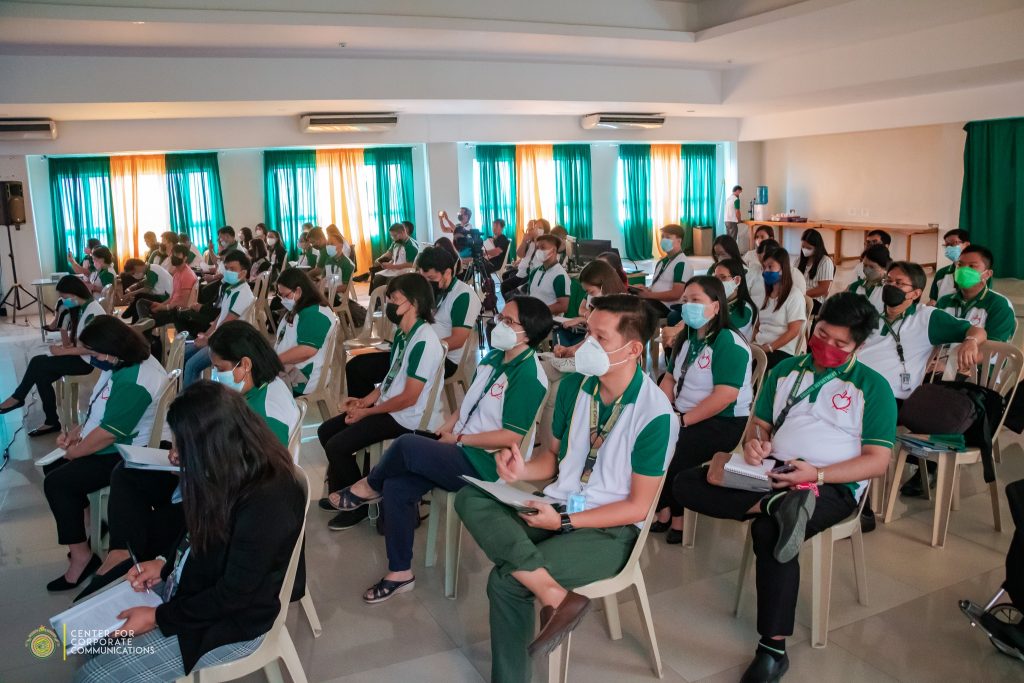INSET 2022 begins; Service-Learning Program, focus of week 1

Faculty of the different departments of San Sebastian College-Recoletos de Cavite and Sacred Heart School of Cavite-Recoletos de Alfonso converged at the Multipurpose Hall in the Main Campus for the first in-person in-service training since the pandemic began. The training event titled “Crafting of the Service-Learning Programs Across All Disciplines and Levels” was held on July 4 at 9:00 a.m., and is expected to bolster Recoletos Hybrid Flexible Learning.
Delivered by Fray Rafael B. Pecson, OAR, School President of SSC-R de Cavite and newly elected President of the Recoletos Educational Apostolate in the Philippines (REAP), the talk centered on how service learning could be implemented across various curricula to form students who are persons with others.


According to Fray Pecson, the Service-Learning Program would be anchored on Catholic social teachings, with the idea that students who are moved by the suffering of others would likewise be moved to action, and in the process discover that learning is to serve and to serve is to learn.
Fray Pecson added that the Service-Learning Program takes into consideration the United Nations’ Sustainable Development Goals and is intended to highlight Solidarity and Justice as an Augustinian Value.
The program began with the invocation by Ana D. Manzano, Director of the Center for Recoletos Community Outreach Program (ReCOP). This was followed by the singing of the National Anthem led by Rheymard G. Doneza, MBA, Director of the Center for Information and Communications Technology. The latter also provided the rationale for the day’s activity.
Fray Pecson discussed various aspects of service-learning, including its philosophy of making a difference through paying it forward, and serving and defending the poor who are unable to defend themselves, in order to produce persons with others, a school with others, and a community with others.
Fray Pecson said that the aforementioned program is rooted in Augustinian Pedagogy, which underscores the value of experiential learning where principles of reflection, reciprocity, and community voice can be applied.


The REAP President went on to expound on the concept of reflection, as well as defining service and service learning. He explained that service involves connecting passion to someone else’s need by carefully paying attention to the outside world and taking appropriate action. As for service learning, he said that it is the extension of engagement with classroom curriculum into real life situations.
Moreover, Fray Pecson discussed the stages of service learning, which includes investigation, preparation, action, and demonstration. He also elaborated on the benefits of service learning to faculty, students, and community agencies. In addition to inspiring students to learn and increasing their resilience, he said that service-learning programs have been proven by research to boost academic performance. He also said that such programs can lead to improved self-worth.
Fray Pecson also enumerated the different approaches to service learning, namely civic engagement approach, social justice approach, and critical service learning. He mentioned that of the three, the first two approaches would be utilized for SSC-R de Cavite’s service-learning program.


After a brief Q & A session with the School President regarding the task at hand, participants proceeded in groups to either the St. Thomas of Villanova Learning Resource Center or Room 203 in the St. Augustine Building, or remained in the Multipurpose Hall, to work on their respective department’s syllabus/lesson plan preparations as part of the training activity.
